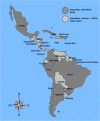Founder and Recurrent Mutations in BRCA1 and BRCA2 Genes in Latin American Countries: State of the Art and Literature Review
- PMID: 27286788
- PMCID: PMC4943386
- DOI: 10.1634/theoncologist.2015-0416
Founder and Recurrent Mutations in BRCA1 and BRCA2 Genes in Latin American Countries: State of the Art and Literature Review
Abstract
Background: Numerous epidemiological factors affect the probability of developing breast or ovarian cancer, but no predictor is as determinant as inheriting a mutation in BRCA1 or BRCA2. The concept of the founder effect explains the reduced genetic variability in some populations, according to the theory that new populations can be formed from a reduced number of individuals, so the new population would carry only a small fraction of the genetic variability of the original population. The main purpose of this review is to provide an update on the state of the art in founder mutations and some recurrent mutations that have recently been described in Latin America.
Methods: A literature search was performed in the electronic databases of PUBMED, EMBASE, LILACS, and BIREME using the terms BRCA1, BRCA2, founder mutation, Latin American population, and Hispanic. Sixty-two papers were identified, of which 38 were considered relevant for this review. Each result is shown per country.
Results: In Latin America, clear founder effects have been reported in Mexico (BRCA1 del exons 9-12), Brazil (BRCA1 5382insC and BRCA2 c.156_157insAlu), and Colombia (BRCA1 3450del4, A1708E, and BRCA2 3034del4) and in Latinas residing in Southern California (BRCA1 185delAG, IVS5+1G>A, S955x, and R1443x). Of these, mutation BRCA1 3450del4 has also been reported in Brazil and Chile, whereas mutation BRCA2 3034del4 has been reported in Argentina and Peru. These data support the idea that although most Hispanic populations are the result of a mixture between Europeans, Africans, and Amerindians, the relative proportion of each genetic component varies throughout the Hispanic populations, making it necessary to identify the mutations characteristic of each population to generate mutation profiles adjusted to each one of them.
Conclusion: In Latin American countries, and even among regions of the same country, there is great heterogeneity of ancestors. Therefore, Latinas should not be analyzed like other population groups without taking into account their genetic ancestry. The presence of founder mutations in specific population groups represents a cost-effective analysis. The importance of determining the founder mutations lies mainly in the decrease in costs. If we manage to decrease costs, screenings could be offered more widely and cover a larger number of women.
Implications for practice: Hispanic and African-American populations are four to five times less likely than other populations worldwide to receive screening for BRCA mutations, a main reason being the high costs of these tools. The present study seeks to identify the prevalent mutations and the founder effect in the BRCA gene in the Hispanic population to address specific panels for this population group in the future and develop strategies for population screening.
Keywords: BRCA1; BRCA2; Breast cancer; Hereditary cancer; Hispanics; Latin America.
©AlphaMed Press.
Conflict of interest statement
Disclosures of potential conflicts of interest may be found at the end of this article.
Figures
References
-
- Ferla R, Calò V, Cascio S, et al. Founder mutations in BRCA1 and BRCA2 genes. Ann Oncol. 2007;18(suppl 6):vi93–vi98. - PubMed
-
- Fackenthal JD, Olopade OI. Breast cancer risk associated with BRCA1 and BRCA2 in diverse populations. Nat Rev Cancer. 2007;7:937–948. - PubMed
-
- Foulkes WD, Shuen AY. In brief: BRCA1 and BRCA2. J Pathol. 2013;230:347–349. - PubMed
-
- Foulkes WD. BRCA1 and BRCA2—update and implications on the genetics of breast cancer: a clinical perspective. Clin Genet. 2014;85:1–4. - PubMed
-
- Barnes DR, Antoniou AC. Unravelling modifiers of breast and ovarian cancer risk for BRCA1 and BRCA2 mutation carriers: Update on genetic modifiers. J Intern Med. 2012;271:331–343. - PubMed
Publication types
MeSH terms
LinkOut - more resources
Full Text Sources
Other Literature Sources
Miscellaneous


